UNITED NATIONS: Be realistic. Show patience. Engage. And above all, don’t isolate. Those are the pillars of an approach emerging in Pakistan to deal with the fledgling government that is suddenly running the country next door once again — Afghanistan’s resurgent, often-volatile Taliban.
Pakistan’s government is proposing that the international community develop a road map that leads to diplomatic recognition of the Taliban — with incentives if they fulfill its requirements — and then sit down face to face and talk it out with the militia’s leaders.
Pakistani Foreign Minister Shah Mehmood Qureshi outlined the idea Wednesday in an interview with The Associated Press on the sidelines of the UN General Assembly’s meeting of world leaders.
“If they live up to those expectations, they would make it easier for themselves, they will get acceptability, which is required for recognition,” Qureshi told the AP. “At the same time, the international community has to realize: What’s the alternative? What are the options? This is the reality, and can they turn away from this reality?”
He said Pakistan “is in sync with the international community” in wanting to see a peaceful, stable Afghanistan with no space for terrorist elements to increase their foothold, and for the Taliban to ensure “that Afghan soil is never used again against any country.”
“But we are saying, be more realistic in your approach,” Qureshi said. “Try an innovative way of engaging with them. The way that they were being dealt with has not worked.”
Expectations from the Taliban leadership could include an inclusive government and assurances for human rights, especially for women and girls, Qureshi said. In turn, he said, the Afghan government might be motivated by receiving development, economic and reconstruction aid to help recover from decades of war.
He urged the United States, the International Monetary Fund and other countries that have frozen Afghan government funds to immediately release the money so it can be used “for promoting normalcy in Afghanistan.” And he pledged that Pakistan is ready to play a “constructive, positive” role in opening communications channels with the Taliban because it, too, benefits from peace and stability.
This is the second time that the Taliban, who adhere to a strict version of Islam, have ruled Afghanistan. The first time, from 1996 to 2001, ended when they were ousted by a US-led coalition after the 9/11 attacks, which were directed by Osama bin Laden from Afghanistan.
During that rule, Taliban leaders and police barred girls from school and prohibited women from working outside the home or leaving it without a male escort. After they were overthrown, Afghan women still faced challenges in the male-dominated society but increasingly stepped into powerful positions in government and numerous fields.
But when the US withdrew its military from Afghanistan last month, the government collapsed and a new generation of the Taliban resurged, taking over almost immediately. In the weeks since, many countries have expressed disappointment that the Taliban’s interim government is not inclusive as its spokesman had promised.
While the new government has allowed young girls to attend school, it has not yet allowed older girls to return to secondary school, and most women to return to work despite a promise in April that women “can serve their society in the education, business, health and social fields while maintaining correct Islamic hijab.”
Pakistan, which shares a long border with Afghanistan, has a long and sometimes conflicted relationship with its neighbor that includes attempts to prevent terrorism there and, some say, also encouraging it, which Islamabad denies. The Islamabad government has a fundamental vested interest in ensuring that whatever the new Afghanistan offers, it is not a threat to Pakistan.
That, Qureshi says, requires a steady and calibrated approach.
“It has to be a realistic assessment, a pragmatic view on both sides, and that will set the tone for recognition eventually,” the Pakistani minister said. The good news, he said: The Taliban are listening, “and they are not insensitive to what is being said by neighbors and the international community.”
How does he know they’re listening? He says the interim government, drawn mostly from Afghanistan’s dominant Pashtun ethnic group, made some additions on Tuesday. It added representatives from the country’s ethnic minorities — Tajiks, Uzbeks and Hazaras, who are Shiite Muslims in the majority Sunni Muslim country.
“Yes, there are no women yet,” Qureshi said. “But let us let the situation evolve.”
He stressed that the Taliban must make decisions in coming days and weeks that will enhance their acceptability.
“What the international community can do, in my view, is sit together and work out a roadmap,” Qureshi said. “And if they fulfill those expectations, this is what the international community can do to help them stabilize their economy. This is the humanitarian assistance that can be provided. This is how they can help rebuild Afghanistan, reconstruction and so on and so forth.”
He added: “With this roadmap ahead, I think an international engagement can be more productive.”
On Wednesday night, UN Secretary-General Antonio Guterres said after a meeting of the five permanent members of the UN Security Council that all five nations — the United States, China, Britain, Russia and France — want “an Afghanistan at peace, stable, where humanitarian aid can be distributed without problems or discrimination.”
He also described a hoped-for “Afghanistan where the rights of women and girls are respected, an Afghanistan that won’t be a sanctuary for terrorism, an Afghanistan where we have an inclusive government representing the different sectors of the population.”
Qureshi said there are different forums where the international community can work out the best way to approach the situation. In the meantime, he asserted, things seem to be stabilizing. Less than six weeks after the Taliban seized power on Aug. 15, he said, Pakistan has received information that the law-and-order situation has improved, fighting has stopped and many internally displaced Afghans are going home.
“That’s a positive sign,” Qureshi said.
He said Pakistan hasn’t seen a new influx of Afghan refugees — a sensitive issue for Pakistanis, who are highly motivated to prevent it. A humanitarian crisis, a foundering economy and workers who return to jobs and school but aren’t getting salaries and don’t have money could cause Afghans to flee across the porous border into Pakistan, which has suffered economically from such arrivals over decades of conflict.
Qureshi prescribed patience and realism. After all, he says, every previous attempt to stabilize Afghanistan has failed, so don’t expect new efforts to produce immediate success with the Taliban. If the United States and its allies “could not convince them or eliminate them in two decades, how will you do it in the next two months or the next two years?” he wondered.
Asked whether he had a prediction of what Afghanistan might be like in six months, Qureshi turned the question back on his AP interviewer, replying: “Can you guarantee me US behavior over the next six months?”
Pakistan says international community can’t ‘turn away’ from reality of Afghan Taliban
https://arab.news/p7z7v
Pakistan says international community can’t ‘turn away’ from reality of Afghan Taliban
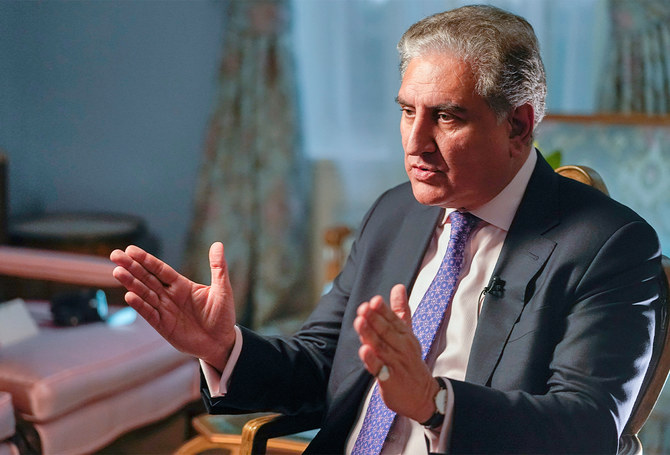
- Pakistan’s government is proposing global powers develop a road map that leads to diplomatic recognition of Taliban
- Expectations from Taliban include an inclusive government and assurances for human rights, especially for women and girls
Saudi cadet bags gold medal as fresh batch graduates from Pakistan Military Academy
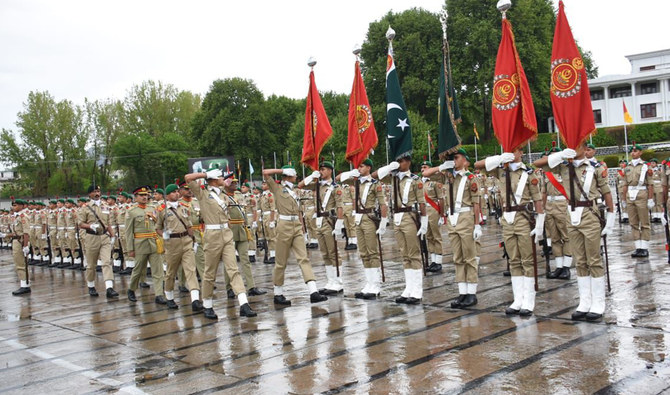
- Forty-nine cadets from “friendly countries” graduate from Pakistan Military Academy in Kakul, says army
- The PMA provides initial training to Pakistani cadets and recruits from friendly countries such as Saudi Arabia
ISLAMABAD: The Pakistan Army awarded the Chairman Joint Chiefs of Staff Committee Overseas Gold Medal to a Saudi cadet in recognition of his performance, as a fresh batch of local and international cadets graduated from the Pakistan Military Academy (PMA) on Saturday, the army’s media wing said.
General Sahir Shamshad Mirza, chairman joint chiefs of staff committee, was the chief guest at the passing out parade of the 149th PMA Long Course at the academy in Kakul. General Metin Gürak, the chief of the Turkish general staff who is on an official visit to Pakistan, was the guest of honor at the ceremony.
Gen. Mirza reviewed and spoke to cadets at the parade while General Gürak presented the awards to the distinguished cadets, the Inter-Services Public Relations (ISPR) said.
“The Chairman Joint Chiefs of Staff Committee Overseas Gold Medal was awarded to Friendly Country Senior Under Officer Fahad Bin Aqil Al Towarqi Al Fallaj from Kingdom of Saudi Arabia,” the ISPR said.
The army’s media wing said 49 cadets from “friendly countries” also graduated at the ceremony. The coveted Sword of Honour was awarded to Academy Senior Under Officer Muhammad Nauman Abdullah.
The President’s Gold medal was awarded to Company Senior Under Officer Muhammad Abdullah Javed of the 149th PMA Long Course, the army’s media wing said.
“Since its inception, PMA has remained the cradle of leadership and center of excellence for cadets joining the premier institution of Army,” Gen. Mirza was quoted as saying by the ISPR.
“Over the years, PMA has also trained scores of foreign cadets whose brilliant performance in their respective Armies stands testament to the professional ethos of PMA.”
The PMA in Kakul, Abbottabad, provides initial training to Pakistan Army cadets and recruits from friendly countries, including Saudi Arabia, the Middle East and elsewhere in the world.
Pakistan and Saudi Arabia enjoy fraternal relations, leading the two countries to cooperate in trade, defense and other vital sectors.
The Kingdom is home to over 2.7 million Pakistani expatriates and serves as the cash-strapped South Asian country’s largest source of remittances.
Pakistan to hold by-elections on 21 national, provincial assembly seats on Sunday
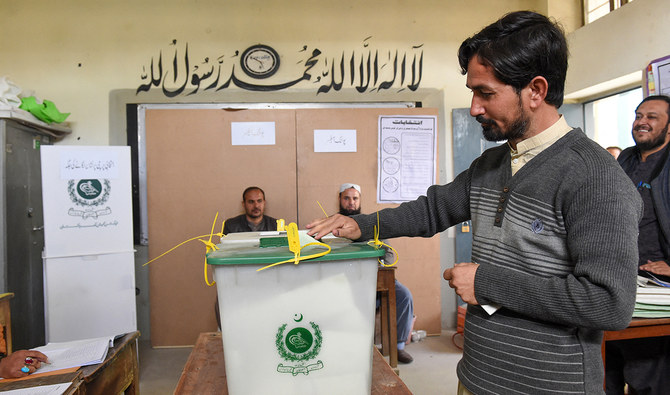
- Polling will be held on seats vacated by candidates or where polling was postponed due to various reasons
- Polling will take place on seats vacated by PM Shehbaz Sharif, Chief Ministers Maryam Nawaz and Ali Amin Gandapur
ISLAMABAD: Pakistan will conduct by-elections on 21 national and provincial seats on Sunday, state-run media reported on Saturday, marking the country’s first major electoral exercise since the contentious general elections of Feb. 8.
The by-elections would be held on the national and provincial assembly seats that were vacated by candidates following the Feb. 8 elections.
Polling on Sunday is scheduled to be held on five National Assembly seats, 12 Punjab Assembly seats, two Khyber Pakhtunkhwa (KP) Assembly seats and two Balochistan Assembly seats.
“Polling will start at 8:00 in the morning and it will continue till 5:00 p.m. without any break,” Radio Pakistan said.
Polling for NA-8 Bajaur and PK-22 Bajaur were postponed on Feb. 8 after the murder of a candidate, Rehan Zeb Khan. Polling will also be held in NA-44 Dera Ismail Khan, where the National Assembly seat was vacated by Ali Amin Gandapur, who retained his provisional assembly seat to become KP’s chief minister.
Similarly, Punjab Chief Minister Maryam Nawaz Sharif vacated her NA-119 seat in Pakistan’s eastern city of Lahore, choosing instead to keep the PP-159 constituency that she also won.
Prime Minister Shehbaz Sharif won elections on two provincial and National Assembly seats. He left the NA-132 Kasur and Lahore’s PP-158 and PP-164 seats vacant, preferring to retain the NA-123 Lahore constituency.
Pakistan Peoples Party (PPP) Chairman Bilawal Bhutto-Zardari won two National Assembly seats. He retained the NA-194 Larkana constituency, leaving the NA-196 seat in Qamber Shahdadkot vacant.
Pakistan’s Feb. 8 elections were marred by delayed results, a countrywide shutdown of mobile phone services and rigging allegations. Jailed former prime minister Imran Khan’s Pakistan Tehreek-e-Insaf (PTI) accused Pakistan’s election regulator of manipulating the results of the elections, claiming in reality it had won over 180 National Assembly seats.
The Election Commission of Pakistan (ECP) rejected the PTI’s allegations, saying polling results were delayed due to the shutdown of mobile phone services countrywide. Pakistan’s caretaker administration had said the mobile services were suspended due to security reasons, rejecting rigging allegations by Khan’s party.
Independent candidates backed by Khan secured the highest number of seats in the National Assembly. However, the Pakistan Muslim League-Nawaz (PML-N) emerged as the largest party in the National Assembly, as a court decision prevented Khan-backed candidates from contesting polls with the PTI’s symbol.
Death toll from heavy rains in northwestern Pakistan rises to 46
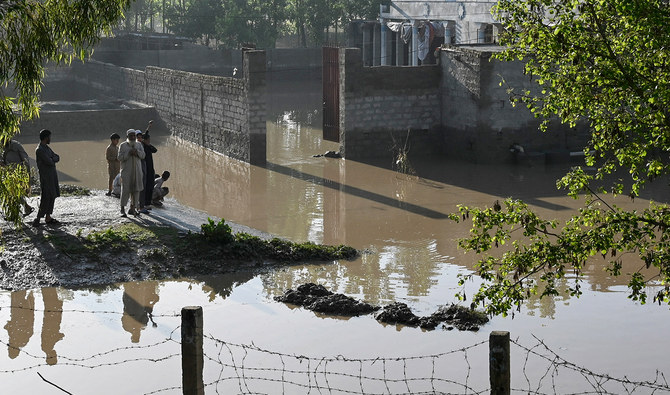
- Forty-six casualties include 25 children, 12 men and nine women, says Provincial Disaster Management Authority
- Heavy rains and lightning strikes have killed at least 36 people in Pakistan’s Punjab and Balochistan provinces since April 12
Peshawar: The death toll from rain-related incidents in northwestern Pakistan rose to 46 on Saturday, the Provincial Disaster Management Authority (PDMA) said on Saturday, while the number of injured climbed to 60.
“As many as 25 children, 12 men and nine women are among those who died in rain-related incidents during the last eight days,” the report said about heavy rains that began in the province last Friday, April 12.
The number of injured has risen to 60, which includes 33 men, 16 children and 11 women, the PDMA said.
The current spell of showers is likely to continue till April 21, the PDMA said this week. The provincial government has released Rs110 million to be distributed among the affected families and dispatched aid, including tents, kitchen kits, blankets, hygiene kits, mosquito nets and mattresses, to the affected areas, according to the authority.
As the rains are expected to continue intermittently until April 21, the PDMA said it had already a letter to all district administrations to remain alert and take precautionary measures.
In the southwestern Balochistan province, heavy rains have killed 15 people since Friday and triggered flash floods in several areas, according to provincial authorities.
Balochistan Chief Minister Sarfaraz Bugti said climate change had become a “challenge” for the provincial government.
“Current rains are unusual which were never reported in a thousand years,” he told reporters on Friday. “The government has been helping the masses with available resources and our teams have reached all districts to help the people affected by rains and floods.”
Pakistan has received heavy rains in the last three weeks that have triggered landslides and flash floods in several parts of the South Asian country.
The eastern province of Punjab has reported 21 lighting- and roof collapse-related deaths, while Balochistan, in the country’s southwest, reported 10 deaths as authorities declared a state of emergency following flash floods.
In 2022, downpours swelled rivers and at one point flooded a third of Pakistan, killing 1,739 people. The floods also caused $30 billion in damages, from which Pakistan is still trying to rebuild.
US sanctions four international companies for aiding Pakistan’s missile program
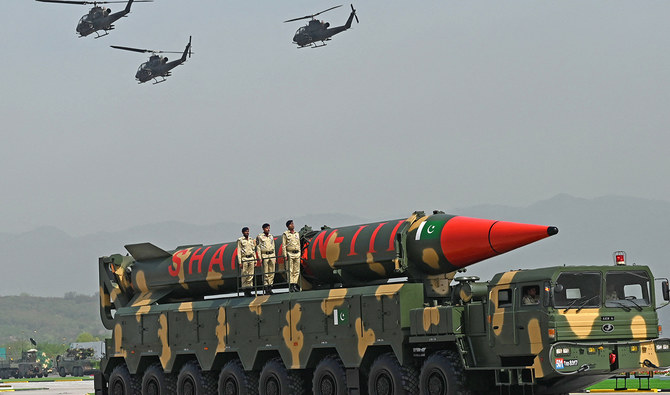
- US State Department announces sanctions against three Chinese companies and one based in Belarus
- State Department says companies supplied missile-applicable items to Pakistan’s ballistic, long-range missile programs
ISLAMABAD: The US State Department announced this week it has imposed sanctions on three Chinese companies and one Belarus-based company for supplying items to Pakistan’s ballistic missile program.
As per a press release, the State Department announced sanctions against China-based companies Xi’an Longde Technology Development Company Limited, Tianjin Creative Source International Trade Co. Ltd, Granpect Company Limited and the Belarus-based Minsk Wheel Tractor Plant.
“These entities have supplied missile‐applicable items to Pakistan’s ballistic missile program, including its long-range missile program,” a press release issued late Friday stated.
The State Department said Minsk Wheel Tractor Plant had worked to supply special vehicle chassis to Pakistan’s long-range ballistic missile program.
“Such chassis are used as launch support equipment for ballistic missiles by Pakistan’s National Development Complex (NDC), which is responsible for the development of Missile Technology Control Regime Category (MTCR) I ballistic missiles,” it said.
Washington alleged Xi’an Longde Technology Development Company Limited supplied missile-related equipment, including a filament winding machine, to Pakistan’s long-range ballistic missile program that was also destined for NDC.
“Filament winding machines can be used to produce rocket motor cases,” the State Department said.
It said the Tianjin Creative Source International Trade Co. Ltd. supplied missile-related equipment to Pakistan’s long-range ballistic missile program, including stir welding equipment.
It said the company’s supplies were likely destined for Pakistan’s Space and Upper Atmosphere Research Commission (SUPARCO), which develops and produces Pakistan’s MTCR Category I ballistic missiles.
It further said Granpect Company Limited worked with SUPARCO to supply equipment for the testing of large-diameter rocket motors.
“In addition, Granpect Co. Ltd. also worked to supply equipment for testing large-diameter rocket motors to Pakistan’s NDC,” it added.
The sanctions mean all property and interests in property of the companies in the US or in possession or control of American citizens are blocked and must be reported to the US Treasury Department’s Office of Foreign Assets Control (OFAC), the State Department said.
They also mean that all transactions by American citizens, or those within (or transiting) the US that involve any property or interests in property of the companies, are prohibited unless authorized by a general or specific license issued by OFAC or exempt.
Pakistan has so far not responded to the US State Department’s action.
Pakistani pacer Mohammad Amir sets sights on T20 World Cup after comeback

- Amir played his first T20 international match for Pakistan on Thursday after a nearly four-year hiatus
- Pacer says he feels his body is fitter compared to 2019 when he last played for Pakistan in a World Cup
ISLAMABAD: Pakistani fast bowler Mohammad Amir said this week he has set his sights on the upcoming T20 World Cup 2024, as he gears up to mark his return to international cricket after a nearly four-year hiatus.
The 32-year-old pacer played his first match on Thursday against New Zealand in Rawalpindi but did not bowl a single delivery as rain suspended play during the first over of the match.
Amir, one of Pakistan’s most prolific fast bowlers, retired in December 2020 after being dropped from the side. He changed his mind last month and decided to restart his career, which had also been stalled by a spot-fixing ban in 2010.
“The way the Pakistan Cricket Board (PCB) management brought me back, it is for a short-term goal, the [T20] World Cup,” Amir told PCB Digital in an interview on Friday. “And that is the biggest goal.”
The left-arm pacer pointed out that Pakistan had played in the semifinal of the T20 World Cup 2021 and competed in the final of the T20 World Cup in 2022. However, it had failed to “cross the line” and become world champions on both occasions.
“If that happens [Pakistan win the World Cup] it would be a huge achievement for me, to be a part of that team,” he said.
Amir said he feels he is much fitter compared to 2019 when he last represented Pakistan in a World Cup tournament.
“See, you cannot express yourself properly in the ground until you’re fit,” he said. “So I feel the way my body feels fresh right now, I can chip in more and prove beneficial to the team via my performance.”
The pacer credited his wife and children for helping him stay positive.
“She makes sure that all my focus is on cricket,” he said. “I think that always gives me energy and helps me to face whatever I have to.”
Pakistan face New Zealand in the second T20 fixture of the five-match series in Rawalpindi today, Saturday. The two sides will lock horns in Rawalpindi on April 21 before meeting for the remaining two fixtures in Lahore on April 25 and 27.
Teams:
Pakistan: Babar Azam (captain), Usman Khan, Abrar Ahmed, Iftikhar Ahmed, Mohammad Rizwan, Mohammad Amir, Muhammad Irfan Khan, Naseem Shah, Saim Ayub, Shadab Khan, Shaheen Shah Afridi
New Zealand: Michael Bracewell (captain), Mark Chapman, Josh Clarkson, Jacob Duffy, Dean Foxcroft, Ben Lister, Jimmy Neesham, Tim Robinson, Ben Sears, Tim Seifert, Ish Sodhi










